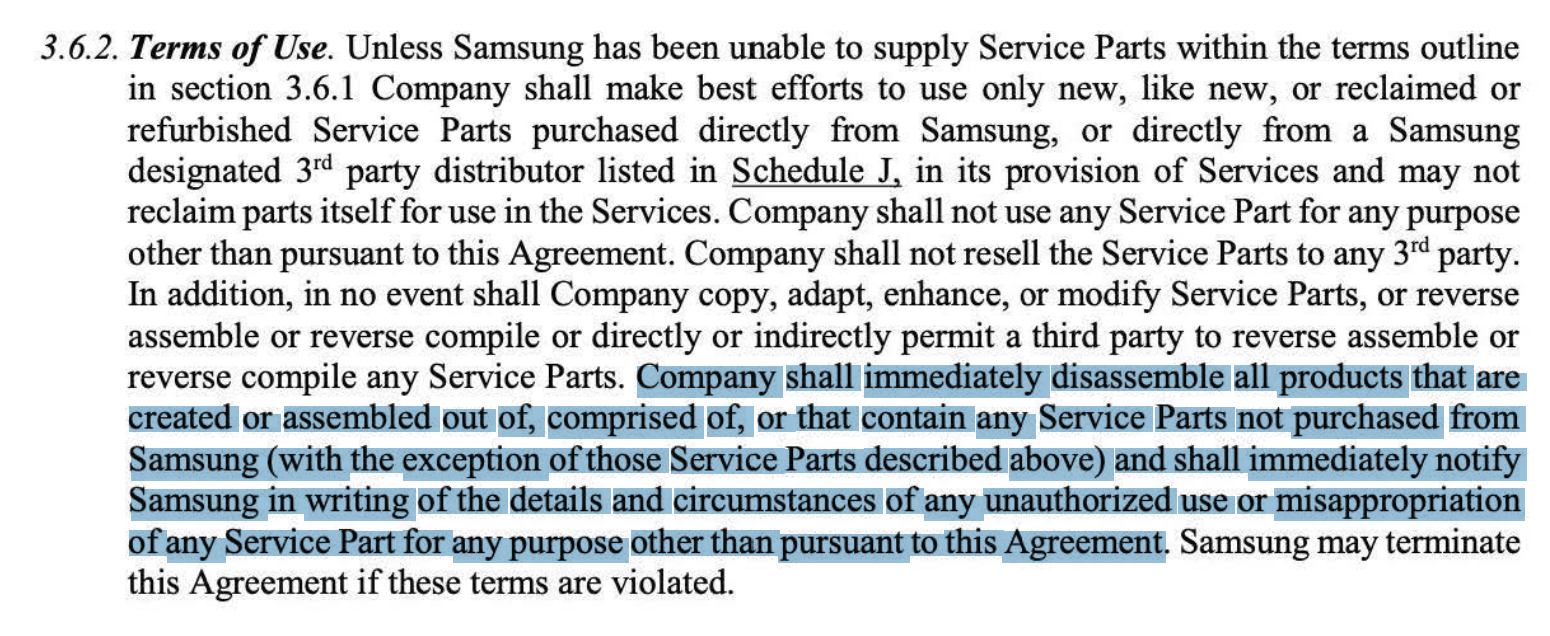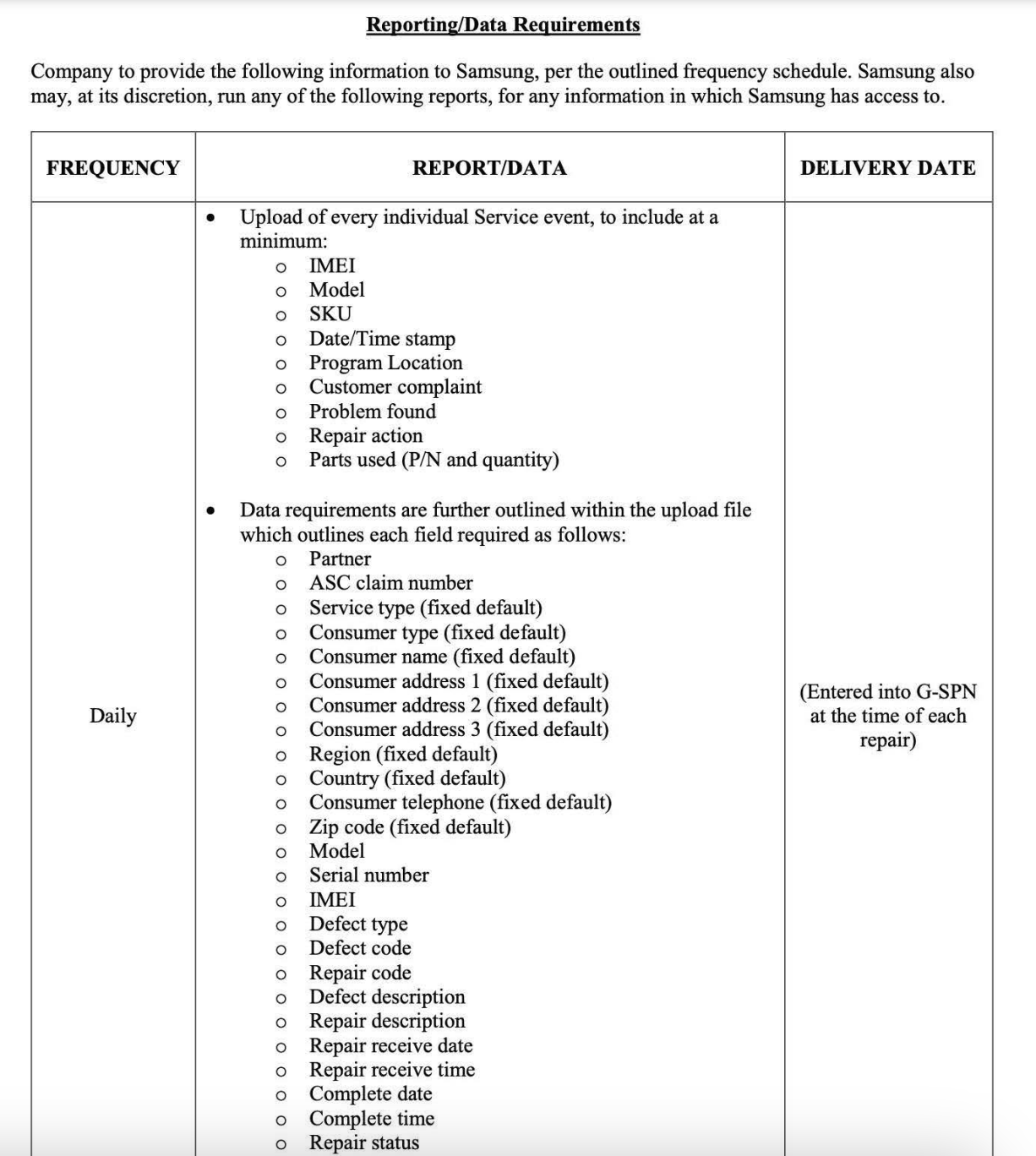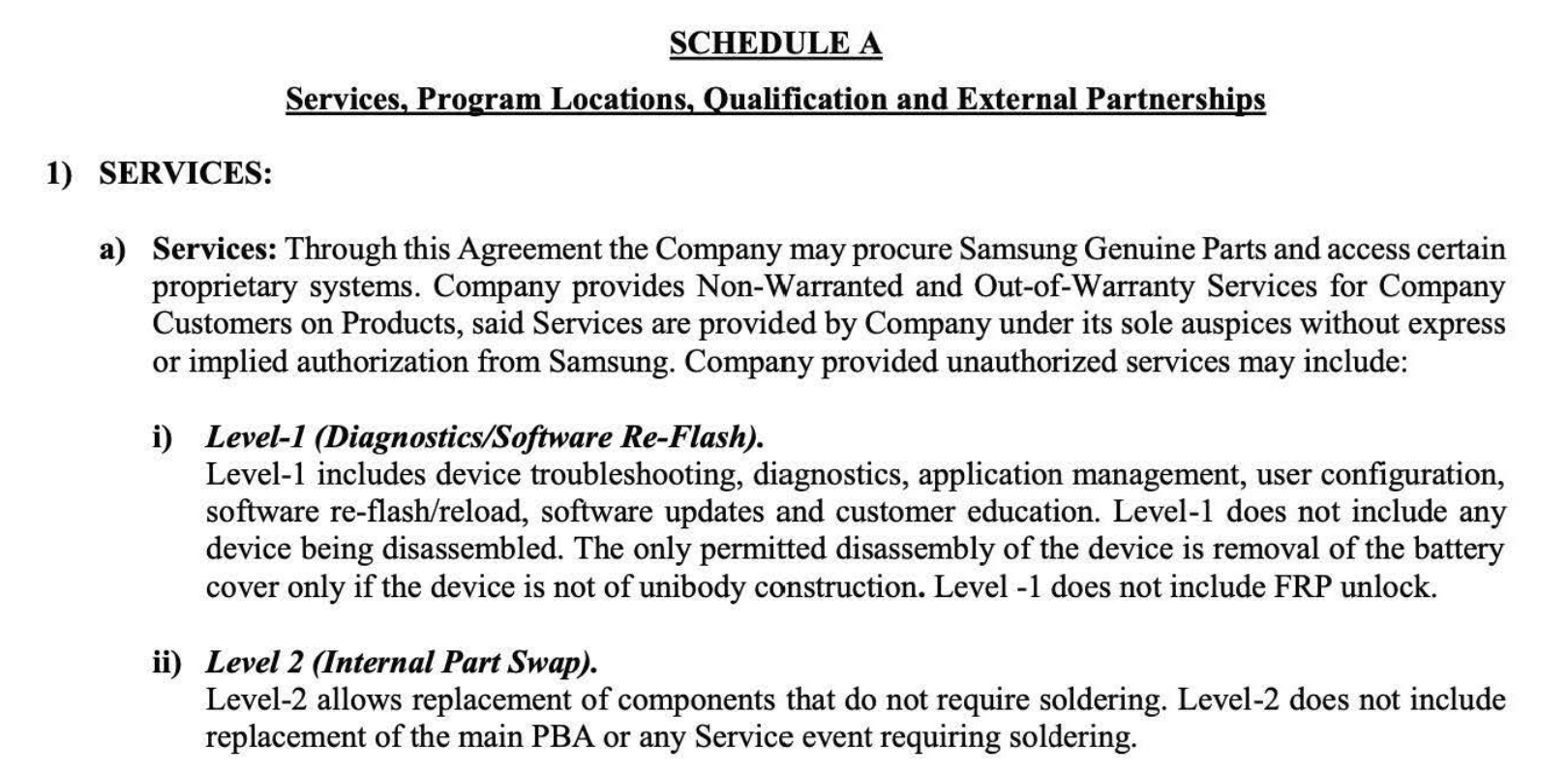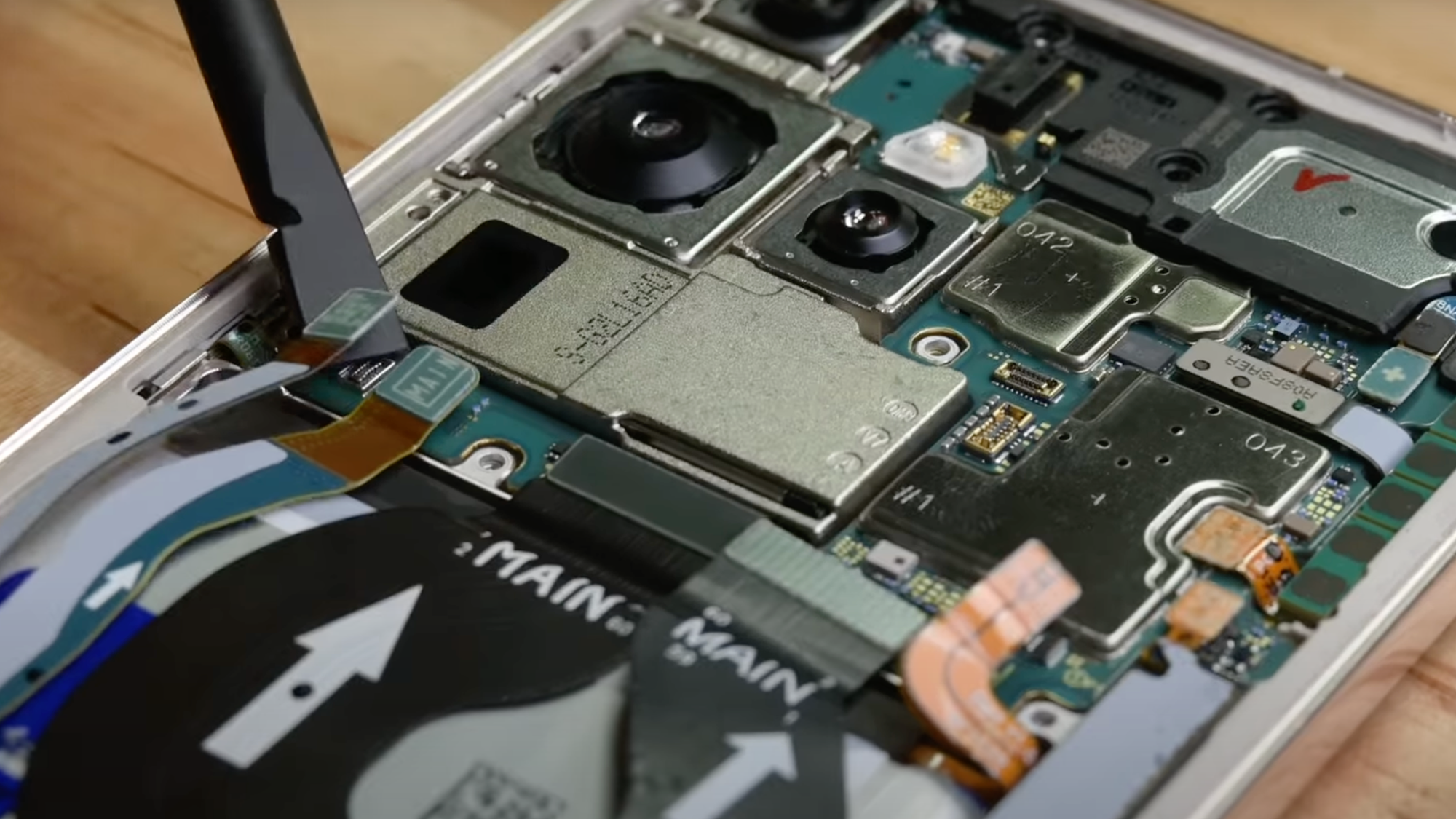Subscribe
In exchange for selling them repair parts, Samsung requires independent repair shops to give Samsung the name, contact information, phone identifier, and customer complaint details of everyone who gets their phone repaired at these shops, according to a contract obtained by 404 Media. Stunningly, it also requires these nominally independent shops to “immediately disassemble” any phones that customers have brought them that have been previously repaired with aftermarket or third-party parts and to “immediately notify” Samsung that the customer has used third-party parts.
"Company shall immediately disassemble all products that are created or assembled out of, comprised of, or that contain any Service Parts not purchased from Samsung,” a section of the agreement reads. “And shall immediately notify Samsung in writing of the details and circumstances of any unauthorized use or misappropriation of any Service Part for any purpose other than pursuant to this Agreement. Samsung may terminate this Agreement if these terms are violated."

The contract also requires the “daily” uploading of details of each and every repair that an independent company does into a Samsung database called G-SPN “at the time of each repair,” which includes the customer’s address, email address, phone number, details about what is wrong with their phone, their phone’s warranty status, details of the customer’s complaint, and the device’s IMEI number, which is a unique device identifier. 404 Media has verified the authenticity of the original contract and has recreated the version embedded at the bottom of this article to protect the source. No provisions have been changed.
The use of aftermarket parts in repair is relatively common. This provision requires independent repair shops to destroy the devices of their own customers, and then to snitch on them to Samsung.
“Presumably, Samsung would try to defend the provision about ‘Service Parts not purchased from Samsung’ requiring a phone to be destroyed as a measure to fight counterfeits,” John Bergmayer, legal director of the consumer rights group Public Knowledge told me. “But the language goes beyond that significantly. Would a customer bring their phone in to be repaired only to have it destroyed? People have a right to use third-party parts under the Magnuson Moss Warranty Act, for one thing, and it's hard to square this contact language with that basic consumer right.”

Aaron Perzanowski, a personal property law expert and professor at the University of Michigan Law School, told me “Most consumers would be very surprised to learn that their personal information and details about their devices are being shared with the manufacturer. And I doubt there is any meaningful disclosure of or consent to sharing that data. So this looks like a substantial and unexpected invasion of consumer privacy.”
The contract shows the incredible level of control that Samsung has over “independent” repair shops, which need to sign this agreement to get repair parts from Samsung. Signing this contract does not even make a repair shop an “authorized” repair center, which is a distinction that requires shop owners to jump through even more hoops.
Experts I spoke to said that the leaked contract shows that “independent” repair through this program isn’t independent at all, and is in fact subject to strict rules from Samsung that the company could not force repair shops to sign in states that have right to repair legislation.


“This is exactly the kind of onerous, one-sided ‘agreement’ that necessitates the right-to-repair,” Kit Walsh, a staff attorney at the Electronic Freedom Foundation and right to repair expert told me. “The data collection is excessive. I may not have chosen to disclose my address or identity to Samsung, yet an added cost of repair—even at an independent shop—is giving that information up. In addition to the provision you mentioned about dismantling devices with third-party components, these create additional disincentives to getting devices repaired, which can harm both device security and the environment as repairable devices wind up in landfills.”
“It requires the independent repair shop to purchase Samsung-approved parts except in rare circumstances, which forecloses competition and allows Samsung to inflate the prices for parts,” Walsh added.
Under right to repair legislation passed in New York, Minnesota, and California, which go into effect this year, manufacturers like Samsung wouldn’t be allowed to require consumers or repair shops to sign contracts like this in order to get repair parts.
The contract also functionally limits the types of repairs these “independent” repair shops are allowed to do and does not authorize the stores to do repairs that require soldering or so-called board-level repair, which are increasingly common types of repairs.
Independent repair shops are also required to get a certification from an organization called WISE, which costs $200 annually and is an arm of the CTIA, a trade group made up of wireless companies like Verizon and AT&T that has repeatedly lobbied against right to repair laws. In effect, independent shops are required to fund an organization lobbying against their interests.
In 2020, Motherboard obtained a contract that Apple required independent repair companies to sign in order to get repair parts from the company. At the time, experts said that Apple’s contract was problematic because it allowed Apple to audit and inspect the shops at any time. The Samsung document is even more onerous because it requires them to essentially serve as enforcers for Samsung and requires the proactive sharing of consumer data.
"This absurd contract is exactly why we need to pass Right to Repair laws. Anti-right to repair lobbyists will often say legislation gets in the way of industry's voluntary actions, but when you get a look under the hood at those ‘voluntary programs,’ it's not a pretty picture,” Nathan Proctor, senior director of consumer rights group U.S. PIRG’s Campaign for the Right to Repair, told me. “No one walks into a repair shop thinking that the technician signed a deal to tattle on you if you have aftermarket parts in your phone. It seems that we need to keep reminding manufacturers that when you sell something, you don't own it anymore. Perhaps legislators can help get the point across by passing laws to protect shop owners so they don't have to sign bad deals like this one.”
Samsung did not respond to a request for comment. But at the Electronics Reuse Conference last fall, Paul Walker, a Samsung executive, told the crowd that the industry had to “accept” that aftermarket parts are regularly used to repair phones.
“The subject of aftermarket parts has always been a controversial area for OEMs [original equipment manufacturers],” he said. “In a perfect world, we would want the repairer, or the customer to use a genuine part from a genuine source. We don’t live in a perfect world. We have to accept that. There will be times when we can’t supply it, when it’s a supply chain issue or a longevity issue. We have to accept that aftermarket parts are going to be used, and that’s fair. The only thing I’d say is we owe it to the customer that when an aftermarket part is used, it’s transparent, so the consumer gets that knowledge up front.”
Perzanowski told me that the language in the contract on aftermarket parts is “very troubling.”
“A narrow reading might limit this to tools or devices that the repair provider owns and uses in the course of repair services,” Perzanowski said. “But I don’t think that’s the natural way to read this provision. The agreement defines ‘Product’ as ‘Mobile Phones, Tablets and Wearable subject to Services described further in Schedule A.’ That would seem to encompass consumers’ devices that are brought in for repair. If a customer brings in a phone for a new battery and the shop notices a third-party screen or other component, they’d be obligated to remove it. The shop would then presumably either charge the customer for a part they didn’t ask for or give them back a device that doesn’t work. I can’t imagine that’s good for generating repeat business, especially if the shop is required to narc on their own customers for the crime of using third-party parts.”
This contract shows that Samsung does not actually accept the use of aftermarket parts—it asks independent repair companies to “disassemble” devices with third-party parts and tell the company when customers use them.


